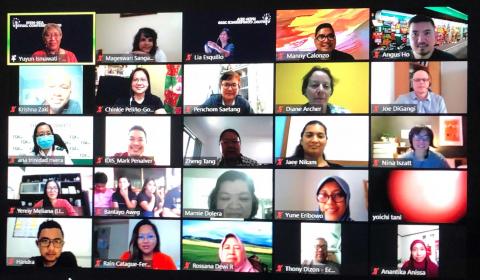Citizen Science Vital for Protecting Community Health from Chemicals and Wastes

Bali, Indonesia/Bangkok, Thailand/Manila, Philippines Experts from various fields and institutions cited the tremendous potentials of citizen science for advancing public participation in research efforts that can generate data, which can increase the negotiation power of communities facing chemical and waste pollution.
At the end last week of the four-part IPEN Southeast and East Asia Virtual Conference, resource persons from Norway, Indonesia and the Philippines and participants from 12 countries discussed perspectives and experiences on citizen science for generating data and for pursuing policies and measures to promote and protect public health and the environment.
Held amid mobility restrictions due to the COVID-19 pandemic, the online conference series was co-organized by the Ecological Alert and Recovery-Thailand, Nexus3 Foundation-Indonesia and EcoWaste Coalition-Philippines with support from the Stockholm Environment Institute (SEI) and IPEN.
Speaking at the conference, Dr. Nina Iszatt, an environmental epidemiologist at the Norwegian Institute of Public Health, tackled the importance of making citizen science more accessible to more people by ensuring its relevance to their lived experiences in everyday life.
“One way of showing how toxic chemicals in the environment are a concern, is by showing that exposure to them has a health impact. In addition, when we understand the exposure pathway, from environmental sources, through to health outcomes, we can see all the options for interventions,” said Iszatt.
Strongly participatory citizen science monitoring efforts generate data that can increase the negotiation power of people fighting pollution, noted Iszatt. “It should be generated within a framework that puts communities at the center. The ultimate aim is to combine knowledge and action for social change to improve community health and eliminate health disparities,” she pointed out.
Dr. Yenny Meliana, Director of the Research Center for Chemistry of the Indonesian Institute of Sciences (LIPI) , and Engr. Ana Trinidad Rivera, Director of the Center for Cosmetic Regulation and Research of the Food and Drug Administration (FDA) of the Philippines both spoke about fruitful citizen science initiatives with non-government organizations and community-based groups in their respective countries.
In Indonesia, LIPI has conducted a study on microplastics in fish samples in collaboration with Nexus3 Foundation, generating further data on tiny plastic particles contaminating the food chain and human bodies and the urgency to adopt plastic pollution prevention policies.
In the Philippines, various examples of government collaboration with environmental health, labor and faith-based groups were highlighted to address toxic chemical poisoning incidents involving arsenic, asbestos, cyanide, lead, mercury and the aerial spraying of pesticides.
Among other benefits, citizen science “builds meaningful relationships with communities to increase engagement and problem solving with local units to promote open government,” noted Rivera, adding “the results of research gained through citizen science projects can be used to inform local policies, as what I have presented enhance formal and informal education initiatives, conserve natural resources, and support environmental sustainability.”
While acknowledging the amazing potential of citizen science in providing useful policy inputs for the government and other stakeholders, “let’s make sure that citizen science projects have sufficient rigor to earn the respect of participants, scientists, and policymakers,” said Rivera.
Dr. Joe DiGangi, Senior Science and Technical Adviser, concluded the experts' presentations by sharing how local citizen science actions have enabled to connect to global policy making, citing three historic successes such as the global prohibition on pesticide endosulfan, the adoption of the global mercury treaty, and the global ban on perfluorooctanoic acid (PFOA) along with its salts and PFOA-related compounds, a group of extremely persistent water pollutant.
For her part, Aileen Lucero, National Coordinator of the EcoWaste Coalition, said: “Public interest groups espousing the people’s health and environmental rights are keen to hone our citizen science skills and foster participatory research with vulnerable populations and collaborators from the government, civil society, academe, media and the scientific and policy communities. As citizen scientists, our prime interest is to help in upholding the people’s well-being by preventing and reducing harms caused by chemicals and wastes and to hold those responsible to account.”
